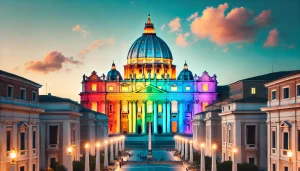
In a world that often finds itself teetering between progress and regression, the recent remarks allegedly made by Pope Francis have sparked a fresh wave of controversy and debate. Known for his more inclusive approach compared to his predecessors, the Pope’s use of the slur frociaggine—faggotry—has not only struck a discordant note but has also raised questions about the true stance of the Church on LGBTQ+ issues.
During a meeting with priests last week, Pope Francis reportedly referred to an ‘air of frociaggine’ within the Vatican itself. This statement, which echoes a similar sentiment he expressed in a previous meeting with bishops, for which the Vatican later issued an apology, has left many bewildered. Despite his previous gestures towards inclusivity and acceptance, these words seem to reflect a different, more troubling attitude.
The controversy surrounding Pope Francis’ remarks is further compounded when considering the demographics of the LGBTQ+ community. Studies estimate that about 5% of the population identifies as gay, meaning that in a group of 1,000 men, approximately 50 would be gay . This statistic underscores the significant number of individuals who could be affected by the Pope’s language who most likely work within the walls of the Vatican.
For many gay men within the Church, these words feel like a direct affront to their identity and existence. The impact of such derogatory language is not merely theoretical; it translates into real-world experiences of marginalisation and exclusion, exacerbating the challenges they face in seeking acceptance within their religious community. The Church, therefore, must grapple not only with its doctrinal stance but also with the very real human implications of its leaders’ words and actions.
It’s worth noting that Pope Francis has made several progressive statements regarding LGBTQ+ individuals in the past. His now-famous remark, ‘Who am I to judge?’, regarding gay priests suggested a shift towards a more compassionate and understanding Church. However, this recent use of an anti-gay slur undermines those efforts and casts a shadow over his papacy’s legacy of tolerance.
For many LGBTQ+ Catholics, these comments are not just hurtful but deeply personal. The Church, for centuries, has held significant sway over the lives of its followers, and its stance on homosexuality has been a source of pain and alienation for many. The Pope’s remarks, therefore, do not just represent a lapse in judgment but a regression to a time when such language was used to marginalise and demean.
The backlash from gay rights groups has been swift and fierce. Activists argue that such language perpetuates stigma and discrimination, making it harder for LGBTQ+ individuals to find acceptance within their communities. They point out that the Pope’s words, whether intended to be harmful or not, carry immense weight and can influence the attitudes of millions of Catholics worldwide.
Moreover, these comments have sparked a broader discussion about the Church’s approach to LGBTQ+ issues. While Pope Francis has taken steps towards a more inclusive Church, there remains a significant gap between rhetoric and reality. The Catechism of the Catholic Church still refers to homosexual acts as ‘intrinsically disordered’, and many within the Church hierarchy continue to resist any change in this doctrine.
The Vatican’s apology following the initial use of the slur was a necessary step, but it also highlights the internal conflict within the Church regarding these issues. On one hand, there is a desire to modernise and embrace a more compassionate stance; on the other, there is a reluctance to fully depart from traditional teachings. This tension is emblematic of the broader struggle within the Church as it grapples with contemporary social issues.
In considering the impact of the Pope’s remarks, it’s crucial to reflect on the lived experiences of LGBTQ+ Catholics. For many, the Church is not just a religious institution but a community and a source of spiritual support. When the leader of that community uses derogatory language, it can feel like a personal attack, a reminder that they are not fully accepted.
There is also the question of accountability. While the Vatican’s apology is a positive step, it must be accompanied by concrete actions to address the underlying issues. This could include more robust anti-discrimination policies within the Church, greater support for LGBTQ+ clergy and laypeople, and a reaffirmation of the Church’s commitment to inclusivity.
Pope Francis has the opportunity to turn this controversy into a catalyst for positive change. By openly addressing the harm caused by his words and taking steps to ensure that the Church genuinely welcomes all its members, he can reinforce his legacy as a compassionate and forward-thinking leader. It is not enough to apologise; the Church must also act.
In conclusion, the recent remarks by Pope Francis have highlighted the ongoing challenges faced by the Catholic Church in its relationship with the LGBTQ+ community. While his papacy has been marked by efforts towards greater inclusivity, these comments serve as a stark reminder of the work that still needs to be done. For LGBTQ+ Catholics, the journey towards acceptance and understanding within the Church continues, and it is incumbent upon all within the Church to support them on this path.
The Church’s stance on LGBTQ+ issues is not just a matter of doctrine but of humanity. As the world continues to evolve, so too must the institutions that guide it. By embracing compassion, understanding, and inclusivity, the Catholic Church can ensure that it remains a beacon of hope and support for all its followers, regardless of their sexual orientation.













